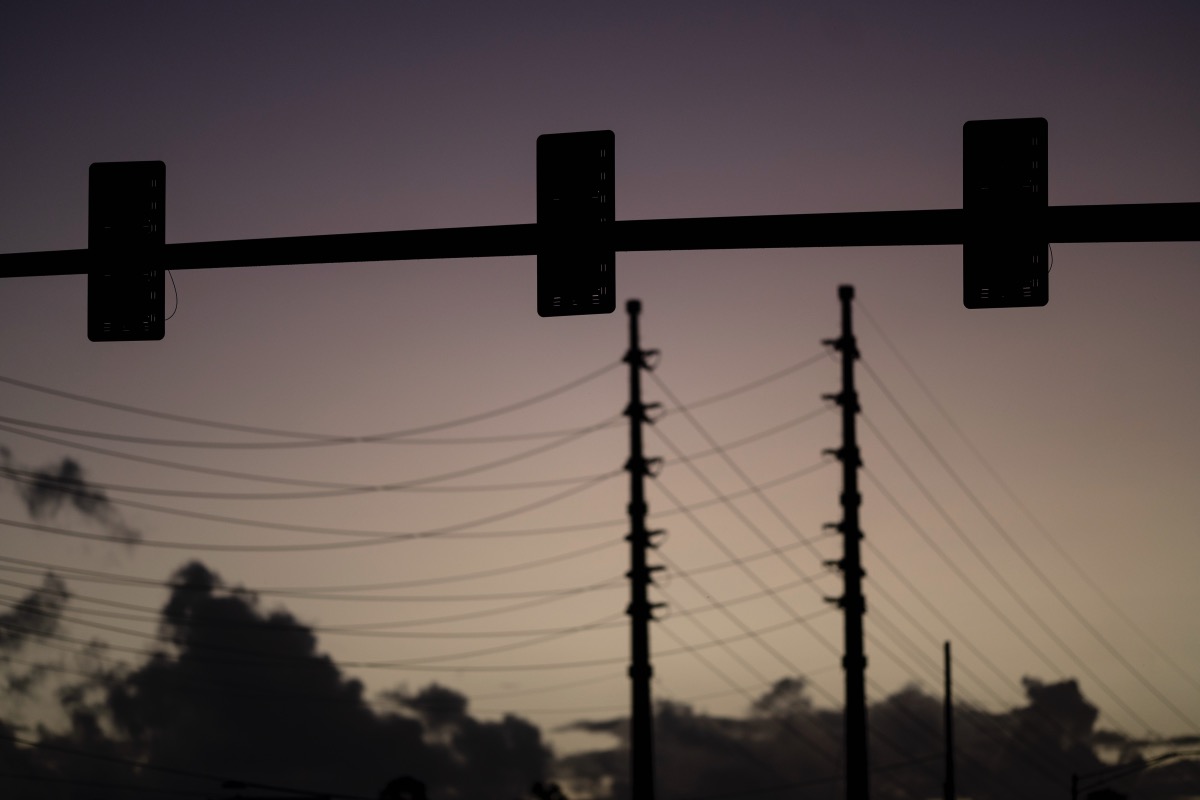

Traffic lights are out of service on a street in San Juan, Puerto Rico, early Thursday, April 7, 2022. (AP Photo/Carlos Giusti)
As they say, “denial is not a river in Egypt.”
Someone needs to share this with Puerto Rico House Speaker Rafael “Tatito” Hernández of the Popular Democratic Party (PPD, in Spanish). After 400,000 of the main island’s residents lost electrical power on April 6, Hernández said that the Puerto Rico Electrical Power Authority (PREPA) should remain the island’s energy supplier.
La @AEEONLINE sin intermediario realizaba un mejor servicio.
La corporación pública administrada por buenos profesionales y proveedores puertorriqueños puede operar de forma más efectiva todo el sistema energético de la Isla.
????
— Tatito Hernandez (@tatitohdz) April 7, 2022
“A public corporation managed by good Puerto Rican professionals and suppliers can more effectively operate the entire energy system of the Island,” Hernández tweeted.
His assertion ignores the mismanagement and corruption that pushed PREPA into bankruptcy in 2017. By denying that the people’s energy provider failed, Speaker Hernández and the PPD are blocking the creation of a reliable, stable, and reasonably-priced alternative.
PREPA was already crumbling before Hurricane Maria destroyed 80 percent of the power company’s distribution lines in 2017. Long-deferred maintenance accelerated the deterioration of a crumbling electricity grid, an old, fossil fuel-based generation fleet, and a fragile distribution network—all of which made rolling blackouts and power shortages a common occurrence.
Such was the dilapidated state of Puerto Rico’s electricity system when PREPA entered into a public-private partnership agreement with LUMA Energy, LLC, a Canadian-Texas energy consortium in 2020. The $1.5 billion contract over 15 years granted LUMA the right to operate PREPA’s transmission and distribution system. PREPA retains ownership of the power plants that generate electricity.
Gov. Pedro Pierluisi of the New Progressive Party (PNP) endorsed the contract saying that the public-private agreement will allow the Island “to obtain a better electric power service.”
The Union of Workers in the Electricity and Irrigation Industry (UTIER, in Spanish) opposes the contract.
“UTIER and the Puerto Rico labor movement are coming together to demand not only an end to this destructive privatization contract, but a true transformation of our electrical system, which is based on a commitment to 100 percent renewable energy,” said Union President Angel Figueroa Jaramillo.
Ruth Santiago, an environmental attorney from Salinas, told a Congressional oversight committee that the LUMA contract has damaged the lives of island residents.
“Since LUMA Energy took over, Puerto Rico has suffered constant power outages, destructive voltage fluctuations, and fires caused by electric malfunctions,” Santiago testified. “People have taken to calling the frequent outages ‘Hurricane Luma.'”
A Puerto Rico House resolution passed after the April 6 blackout, which called for the termination of the LUMA agreement, did not diminish Gov. Pierluisi’s resolve.
“No one is happy or satisfied with what happened,” Pierluisi told reporters in San Juan. “But the important thing is to establish responsibilities, whatever they may be, and take the appropriate corrective measures to prevent this from happening again. That is what I am focused on.”
Congress has allocated $9.4 billion to the Federal Emergency Management Administration (FEMA) for rebuilding Puerto Rico’s electrical system. UTIER and a coalition of environmental groups are urging FEMA to invest a large portion of those funds in solar power.
“Together with environmental and community groups, UTIER advocates for a transformation to a decentralized grid based on renewable energy to achieve resilience and affordable electricity rates,” the Union wrote in an op-ed.
Sergio M. Marxuach of the Center for a New Economy (CNE) said that the island’s energy problems can be traced back to three of the unpleasant facts about PREPA’s culture that Speaker Hernández refuses to face: negligence, mismanagement, and corruption.
“Handing control back to the masters of disaster is not an option,” Marxuach said. “However, PREPA’s indictment is not LUMA’s vindication. LUMA had about a year to prepare for the takeover of Puerto Rico’s electricity grid and its performance so far has been, in the best case, deficient, and in the worst, dismal. Its management, so far, has utterly failed to deliver on its promises.”
Marxauch stresses that transitioning from a government-owned monopoly to a privately-owned monopoly does nothing to create the reliable and reasonably-priced energy Puerto Rico needs.
“If the current process is limited to transferring a corrupt company in the public sector to a group of corrupt investors in the private sector, we will have accomplished absolutely nothing,” he explained.
The LUMA-PREPA agreement requires a good faith effort from both companies to succeed.
“We suspect that PREPA is clinging to its old ways of doing things, while LUMA has not understood it needs to modify its standard playbook to account for an old, unstable, and unreliable electric system,” a CNE study concluded.
Speaker Hernández is clutching onto the old and familiar as well. So, while denial may not be a river in Egypt, it is keeping those like Speaker Hernández from coming up with new ideas for supplying electricity in Puerto Rico.
***
Gene Roman is a freelance reporter based in New York City. You can email here.



[…] Credit: Source link […]